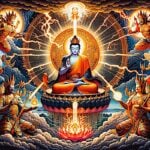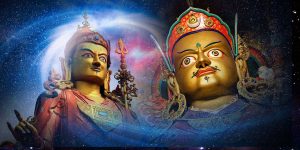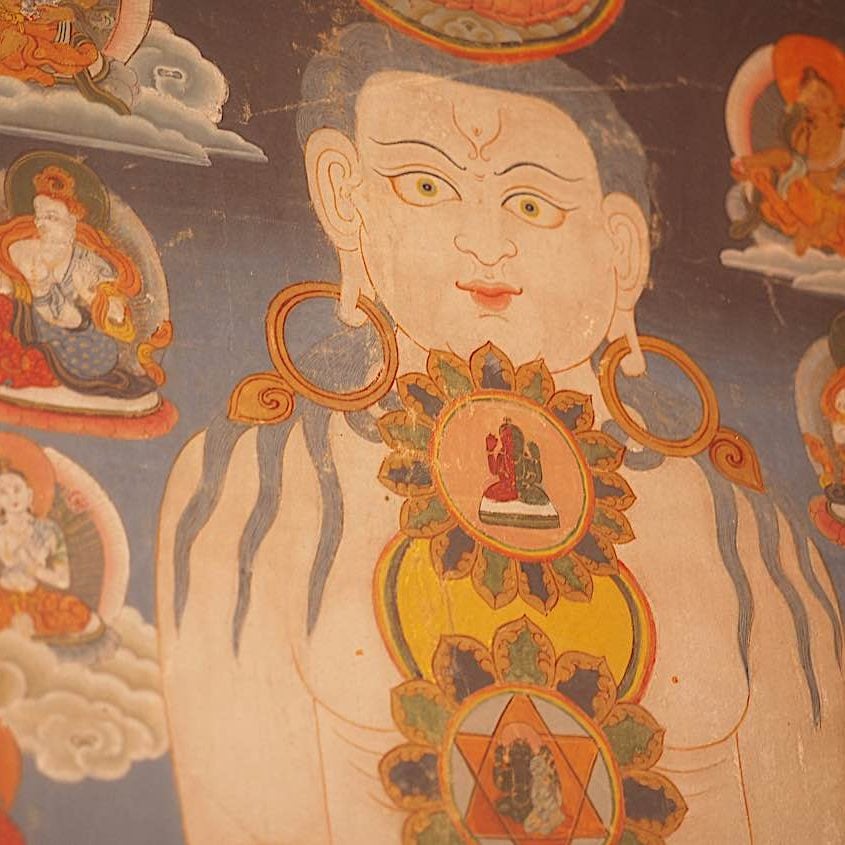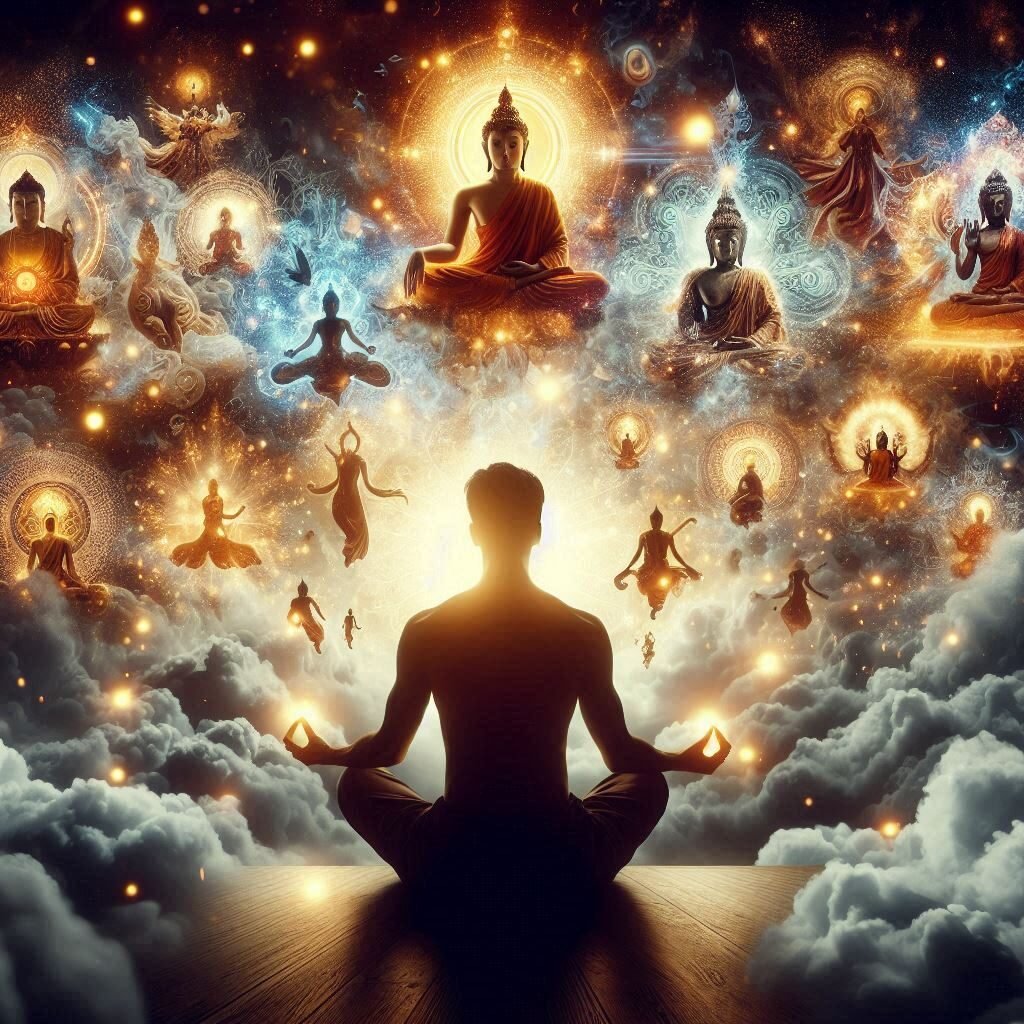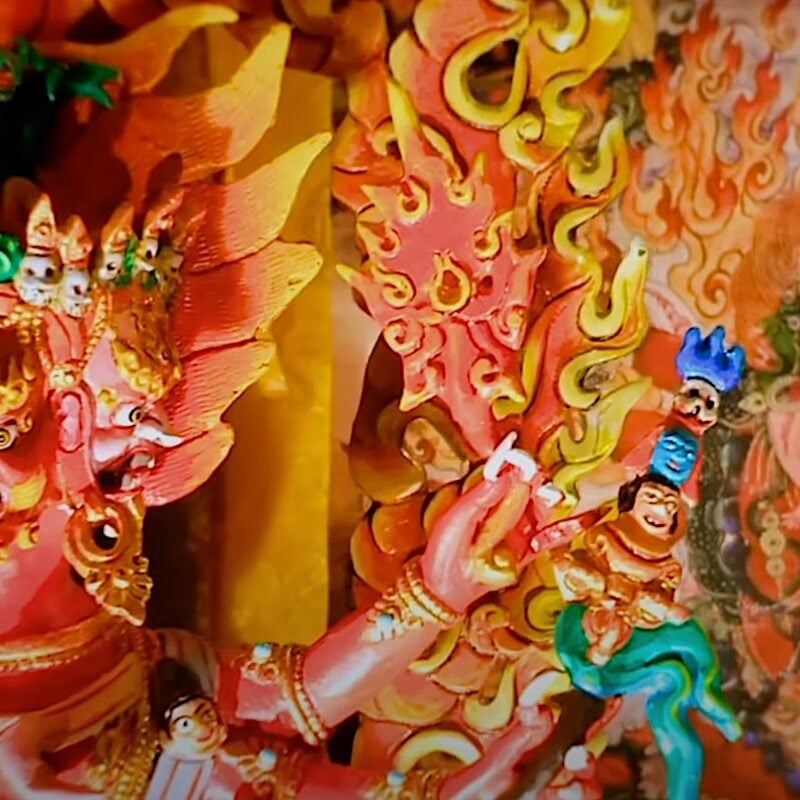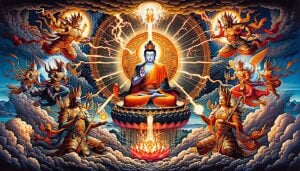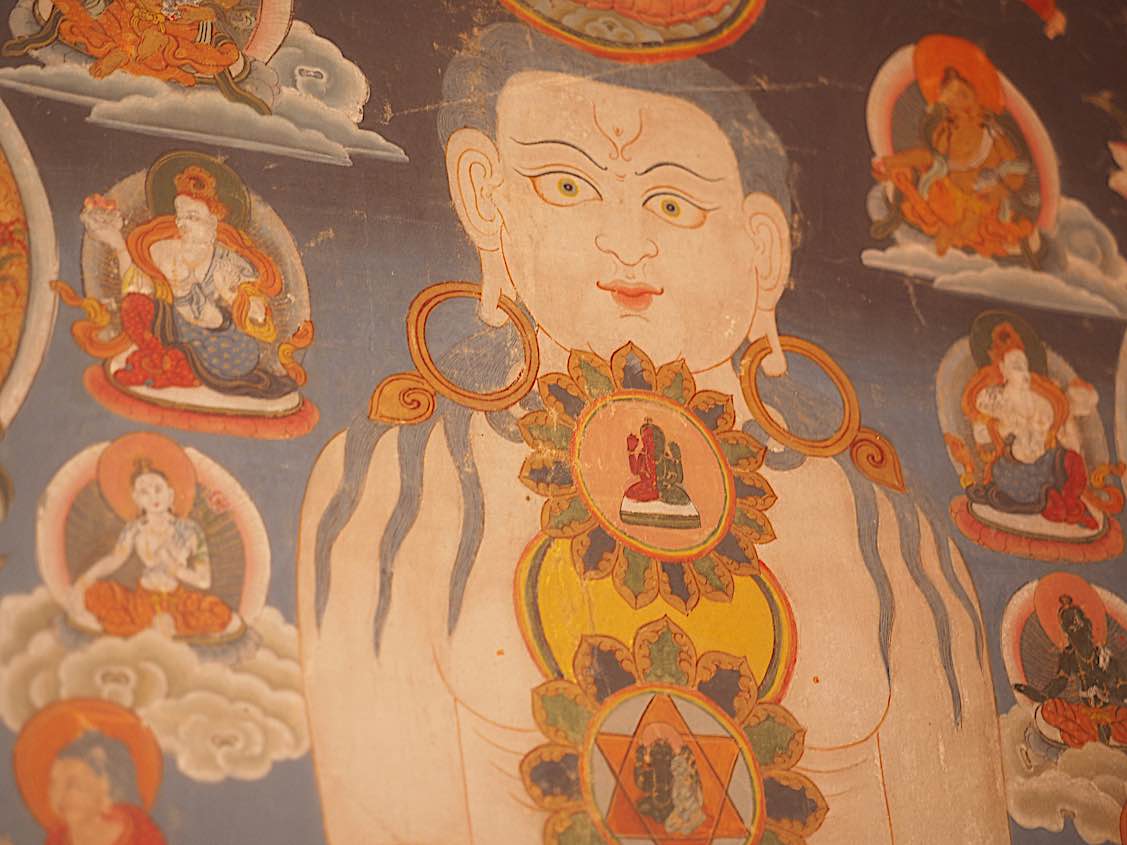4 Practices on Lunar Days: 5 Buddha’s Vow and Practicing Activity, Merit, Reflection, Renewal
Why are lunar days, such as the new moon and full moon, special in Buddhism? What are the four special practice days based on lunar phases that have extra merit for Dharma practice? Why is the New Moon on the last day of the lunar month, special for Purification practices and what are the four practices for New Moon Days that help ensure a positive, prosperous, obstacle-free month ahead? We answer these questions and more in this short video and end with a recitation of the all-important Confession and Five Buddha Vows traditional for the New Moon Day.
4 Important Lunar Days Each Month: Merit Multiplied
The four important Lunar Days are often called Activity Day on the first quarter moon waxing, Supreme Merit Day on the full moon day, Reflection Day on the third quarter waning moon, and Renewal Day on the New Moon. Each of these four days have extra merit for practices, with benefits multiplied millions of times, according to Lama Zopa, quoting the Vinaya text Treasure of Quotations and Logic.
Buddhist calendars are always lunar. This is because Shakyamuni Buddha was born, became Enlightened and attained Parinirvana, all on Full Moon Days.
Video:
Supreme Activity Day: First Quarter Moon, 8th Day Lunar
Supreme Activity Day is on the first quarter moon, the 8th Day of the lunar month. It is called “Supreme” because merit is multiplied. All waxing moon days are otherwise considered Activity Days as well, with normal merit.
As Enlightened Activity Day, it is therefore special to Mother Tara and the Karma Buddha Family of Amoghasiddhi. Or, for example, if the activity you are practicing is medical or health, this can also be Medicine Buddha Day. As the moon grows towards a full moon, we think of the “Enlightened Activities” growing and multiplying.

Activity Day, the 8th Lunar Day, like the other three lunar Dharma days, are extra merit days. We might practice the 21 Tara Praise, or recite Tara’s Sutra or practice the Sadhanas of Tara or Medicine Buddha. We might recite the supplication mantras of each of the 21 Taras to encourage those activities of power and magnetizing, pacifying, enriching and wrathful protective activities.
Special Practices:
- Tara Day: Mother of All the Buddhas
- Amoghasiddhi, Karma Dakini and all Karma Family
- Vajrakilaya: Activity of All the Buddhas

Supreme Merit Day: Full Moon, 15th Day Lunar
The full moon on the 15th day of the lunar month is the Supreme Day of Merit each month. Shakyamuni Buddha was born, became Enlightened and attained Parinirvana on full moon days. According to Mahayana Sutra, all Buddhas in all times were also Enlightened on Full Moon Days. For this reason, this is also Amitabha Day.
On the full moon day, we usually practice Amitabha, Shakyamuni, and Medicine Buddha. If we have a Yidam practice this will normally be an important day for practicing the full Sadhana. This day is the most significant for the Padma Family and practices of Amitabha’s family, such as Kurukulla, Avalokiteshvara, or Hayagriva. This is also a high merit day, with merit multiplied by Millions.
Special Practices:
- Shakyamuni Buddha
- Amitabha Buddha
- Medicine Buddha
- Avalokiteshvara Guanyin
- All Padma Family: Kurukulla, Hayagriva, Padma Dakini

Supreme Reflection Day: Third Quarter, 23rd Day Lunar
Reflection Day, on the third quarter on the 23rd of the lunar month, in the waning period of the moon, is Supreme Day of Reflection, a day of quiet and meditation, ideal for Mahamudra and Dzogchen practices, mindfulness practices and quiet Sutra recitation. It is also special to the Vajra Family of Akshobhya Buddha as the Buddha of Mirror-Like Wisdom.
As the main practice day in the waning period of the moon, it is Supreme Day of Reflection day for quiet and meditation, especially for Akshobhya Buddha and the Varjra Family who represent the practice of the wisdom of Mirror-Like Reflection: “Mind like a Sheet of Water” or the moon reflected in still water. This wisdom overcome the poison of Anger.
Special Practices:
- Mahamudra
- Dzogchen
- Akshobhya Buddha Family
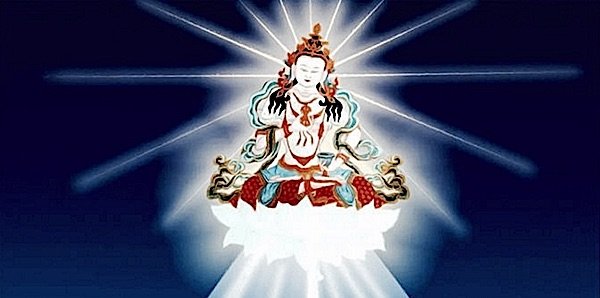
Upavasatha Renewal Day: New Moon, 30th Day Lunar
This brings us back full lunar cycle to the all-important New Moon, or Renewal Day. This day is called Upavasat-ha and is a critical practice day in all traditions of Buddhism for renewal, vows, purification, merit and confession. The New Moon is the day we wield the irresistible power of the Four Opponent Powers.
The last day of the lunar month, or New Moon, is very auspicious and has high merit for all practices but it is especially the day for purifying all the negative karma of the previous month for a fresh start on the new month. Especially important for Mahayana Buddhists is Vajrasattva’s 100-syllable mantra, which purifies all negative karmas. New Moon practices are special to Vajrasattva, the Buddha Family of Vairochana, and the more wrathful purification practices such as Vajrapani and Vajrakilaya. See the information icon for links to beautiful chanting of these Mantras in Sanskrit, ideal for New Moon Day.
Lunar 30th Day, or the New moon, arose as a critical practice day from the ancient tradition of Upavasat-ha or the practice of renewal. The main practices are different variations of the Four Rs, or the Four Opponent Powers. The Four Rs are: Refuge; Regret; Remedy; and Refrain.
Whether you practice Vajrasattva; or Vajrapani; or Vajrakilaya; or the 35 Buddhas; or the renewal of your lay or monastic vows; or Heart Sutra recitation, the four Rs are the same in all of these renewal practices.
Special Practices:
- Vajrasattva
- 35 Confessional Buddhas
- Vajrakilaya: Vajrasattva’s Wrathful Form
- Vajrapani
- Heart Sutra and All Sutra Recitations
- Renewal of Bodhisattva and Vajra Vows
- Four Opponent Powers practices genrally.
All Practices Include Refuge, Regret, Remedy and Refrain
Every one of these practices includes Refuge in the Three Jewels or Three Roots. They all feature a form of Regretting the negative actions — in this case of the past month. They all feature a Remedy, usually a vow, a mantra or sutra recitation. And all of these practices finish with a statement or promise to Refrain in future from negative activities.
The best way to ensure you’re practicing the Four Rs is to renew your Bodhisattva vows and commitments at least on the New Moon day.
Ideally, you do this in front of your Shrine or your teacher after taking Refuge and Prostrating. This makes it a complete purification practice, and a meaningful vow of practice. If you don’t have a shrine or object of Refuge in front of you, you visualize one if you can, or just “know” that you are making your vow in front of the Three Jewels.
Recite along with us now, the Renewal of Your Bodhisattva and Commitment Vows. These are likely the words you spoke during any empowerment, although you may have spoken it in Tibetan or Sanskrit. Here, we’ll recite in English. We start with Refuge in the Three Jewels, Buddha, Dharma and Sangha.
After taking Refuge we Confess all our wrong-doings for the last month. This is followed by the Bodhisattva Vows. Then, we renew our Samaya or promise to the Five Buddha Families. End by dedicating the merit, and you have a very complete purification. The vow itself is the Remedy in this case. Or, you can simply add this vow to your daily practice.
- Practice below, or download the PDF of the Renewal of Bodhisattva and Five Buddha Family Vows here>>

Renewal of Bodhisattva and Five Family Vows
Recite along with us now:
I take Refuge in the three Jewels, the Buddha the Dharma and the Sangha, until I attain Enlightenment for the benefit of all sentient beings.
I rejoice in all virtues of holy and ordinary beings.
I will cultivate the Bodhichitta, to most effectively benefit all sentient beings.
Having generated the intention to take the Buddha’s path, I will care for all sentient beings as my guests. I offer flowers, incense, light, fragrances, food, music and the like, both those actually arranged and those mentally imagined. Supreme gathering, please accept them. Please accept my confession:
Whatever non-virtue, downfalls, and degenerations, I have accumulated since beginningless time, especially those of the Mahayana Vehicle, I confess all without exception, and promise to refrain.
I Remedy my Samaya with the Bodhisattva Vow:
I go for refuge to the Three Jewels. I confess each of my negative actions. I promise to refrain from negative actions. I rejoice in the virtues of migrating beings, and hold with my mind a Buddhas’ enlightenment.
To Buddha, Dharma, and the Supreme Assembly, I go for refuge until I am enlightened, and to accomplish the welfare of myself and others, I will generate the mind of enlightenment.
Having generated the mind of supreme enlightenment, I shall invite all living beings to be my guest, to engage in the pleasing, supreme practices of enlightenment. May I attain Buddhahood to benefit living beings.
I remedy my Samaya with New Commitments:
All Buddhas and Bodhisattvas, please listen to me.
From this time forth, until the essence of enlightenment, I shall generate the unsurpassed sacred Bodhichitta, just as all the Protectors of the three times, have ensured their enlightenment.
I shall uphold firmly each of the three moral disciplines: moral restraint, accumulating virtuous Dharmas, and working for the welfare of living beings.
I renew my Samaya to great Vairochana and the Buddha Family. Please accept my commitment.
I shall uphold from today onward the vows arisen from Buddha Yoga; the unsurpassed Three Jewels of the Buddha, Dharma and Sangha.
To great unshakable Akshobhya and Vajra Family, please accept my commitment.
I shall uphold purely the vajra, bell and mudra of the great, supreme Vajra family, and I shall uphold purely the Master commitment.
I renew my Samaya to great auspicious Ratnasambhava and Jewel Family. Please accept my commitment
I will always make the four types of gifts each day; the pleasing commitments of the great supreme Jewel family.
I renew my Samaya to Infinite Light Amitabha and the Padma Lotus Family. Please accept my commitment.
For the pure, great Lotus family, arisen from great enlightenment, I shall uphold each of the holy Dharmas, of the outer, the secret and the three vehicles.
I renew my Samaya to Supreme Fearless Amoghasiddhi and Tara and the Karma Family. Please accept my commitment:
For the great, supreme Karma family, I shall uphold purely each of the vows I am endowed with, and make as many offerings as I am able.
I shall generate the holy, unsurpassed Bodhichitta, and for the welfare of all living beings, I shall uphold all of my vows without exception.
I shall liberate those not liberated, deliver those not delivered, give breath to those breathless, and lead all beings to nirvana.
I dedicate the merit of this practice and offerings to the cause for Enlightenment for the benefit of all sentient beings.
We dedicate the merit of this presentation to the benefit of all sentient beings. May all beings benefit.
More articles by this author
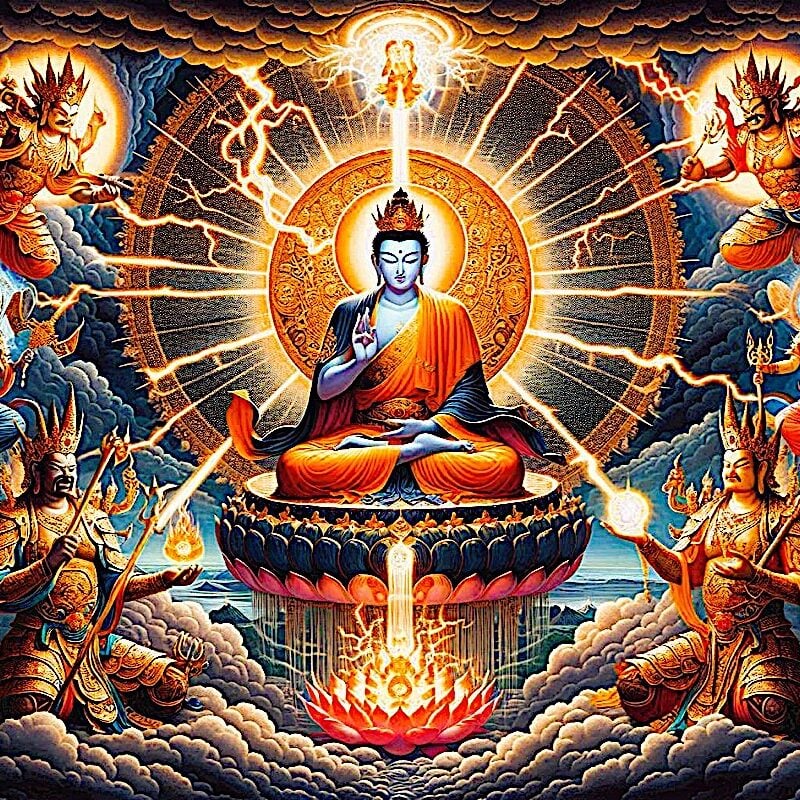
Protection from all Harm, Natural Disaster, Weather, Spirits, Evil, Ghosts, Demons, Obstacles: Golden Light Sutra: Chapter 14

Guru Rinpoche is ready to answer and grant wishes: “Repeat this prayer continuously” for the granting of wishes

VIDEO: Vajrapani Vajra Armor Mantra: Supreme Protection of Dorje Godrab Vajrakavaca from Padmasambhava
Search
Latest Features
Please support the "Spread the Dharma" mission as one of our heroic Dharma Supporting Members, or with a one-time donation.
Please Help Support the “Spread the Dharma” Mission!

Be a part of the noble mission as a supporting member or a patron, or a volunteer contributor of content.
The power of Dharma to help sentient beings, in part, lies in ensuring access to Buddha’s precious Dharma — the mission of Buddha Weekly. We can’t do it without you!
A non-profit association since 2007, Buddha Weekly published many feature articles, videos, and, podcasts. Please consider supporting the mission to preserve and “Spread the Dharma." Your support as either a patron or a supporting member helps defray the high costs of producing quality Dharma content. Thank you! Learn more here, or become one of our super karma heroes on Patreon.
Lee Kane
Author | Buddha Weekly
Lee Kane is the editor of Buddha Weekly, since 2007. His main focuses as a writer are mindfulness techniques, meditation, Dharma and Sutra commentaries, Buddhist practices, international perspectives and traditions, Vajrayana, Mahayana, Zen. He also covers various events.
Lee also contributes as a writer to various other online magazines and blogs.




